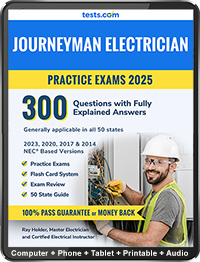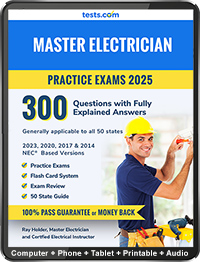Florida Electrician License Exam

To get licensed in Florida, electricians are required to take an exam that covers such subjects as circuits, conductors, grounding, lighting and safety. Whether you live in Tampa, Jacksonville, Orlando or in another city or county, the resources below will help you get started on the path to receive your electricians license.
Need of a License: Electricians need a license to work in Florida. Florida has four types of licenses for electricians: Certified Electrician (EC); Registered Electrician (ER); Certified Electrical Specialty Contractor (ES); and Registered Electrical Specialty Contractor (ET). The difference between a certified contractor and a registered contractor is that the certified contractor can work anywhere in the state of Florida, where the registered contractor is limited to the counties or local municipalities where they hold a local license.
Who Grants a License: Licenses are granted by the Florida Electrical Contractor’s Licensing Board.
Qualifications needed to receive a License: A candidate for the certified electrical contractor license must meet the following experience requirements:
- Must be a licensed electrical engineer for three of the last twelve years; or
- Must have management experience in the trade for at least 3 years of the last 6 years; or
- Must have at least 4 years of experience as a foreman, supervisor or contractor in the trade in the last 8 years; or
- Must have at least 6 years of comprehensive training, technical education or broad experience associated with electrical contracting within the last 12 years; or
- Must have at least 6 years of technical experience in electrical work with the Armed Forces or government entity within the last 12 years; or
- Must have a combination of these qualifications totaling 6 years of experience.
In addition, the candidate for certified electrical contractor must include at least 40% of work that is in 3-phase services.
Exam Requirement: A candidate for a electrical certification needs to take the State Licensing examination. A candidate for electrical registration must take a local competency examination. For more information, see a Candidate Information Booklet.
How to Apply for the License: A candidate for licensure must send in an Application to the Board. Forms can be found online.
Certified Electrical Contractor Application
Registered Electrical Contractor Application
If you use a hard copy of the application, the application must be mailed to:
Department of Business and Professional Regulation
1940 North Monroe Street
Tallahassee, FL 32399-0783
For questions on the application, call (850) 487-1395.
Test Content: Electrical Contractor Certification Exam - The electrical contractor exam consists of two parts, a business section and a technical/safety section. The Business section consists of 50 multiple-choice questions and 2 ½ hours is given to complete the section. The technical/safety section has 100 multiple choice questions and 5 ½ hours is given to complete the section. The exam is is computer based and a score of 75% is needed to pass.
The business section covers the following subject areas:
- Maintaining cash flow
- Estimating and job bidding
- Interpretation of Contracts
- Purchasing Control
- Insurance and bonding
- Compliance with laws and rules
- Personnel management
- Payroll and sales tax
- Financial statements and reports
- Management accounting
The technical/safety section covers the following subject areas depending on the type of license being sought:
Unlimited Electrical Contractor
- General Electrical Knowledge
- Plan and specification reading
- Wiring and protection
- Wiring methods and materials
- Special occupancies and situations
- OSHA, safety, procedures for using tools and equipment
- Life safety and the Americans with Disabilities Act
- Electrical signs, Outline Lighting and Structural Considerations
- Alarm/ Limited engery
Residential Electrical Contractor
- General Electrical Knowledge
- Plan and specification reading
- Wiring and protection
- OSHA, safety, procedures for using tools and equipment
- Residential life safety and the Americans with Disabilities Act
- Motors
- Box fill
- Demand loads
- Conduit fill
- Grounding conductors
- Neutral loads
- Appliance loads
- Service
- Voltage drop
Utility Line Electrical Contractor
- General Electrical Knowledge
- Plan and specification reading
- Wiring and protection
- Wiring methods and materials
- Utility technical/safety
- OSHA, safety, procedures for using tools and equipment
Fees: There are fees to apply to become a licensed electrician.
Who administers the test: Pearson Vue.
License Renewal Requirements – An electrician must renew a license every two years.
Continuing Education: Certified and registered electricians must complete 14 hours of board approved continuing education every two years with at least 7 hours on technical matters, 1 hour on workers compensation, 1 hour on business and 1 hour on safety.
Applicable Regulations: Florida Statutes, Electrical and Alarm System Contracting, 489.501 et seq.
Applicable Electric Code: 2017 NEC
To prepare for your electrician exam, use the following two practice exams by Ray Holder (Master Electrician and Certified Electrical Trade Instructor) which have 300 questions with fully explained answers:
For more information on licensing and exam prep, go to Tests.com's Journeyman and Master Electrician Test Guide.
And take Tests.com's free Journeyman Electrician Practice Test and the Master Electrician Practice Test.
For electrician exam preparation products and services, such as study guides, practice tests, flashcards and courses, go to Tests.com's Journeyman Electrician Exam and Master Electrician Exam listings.



